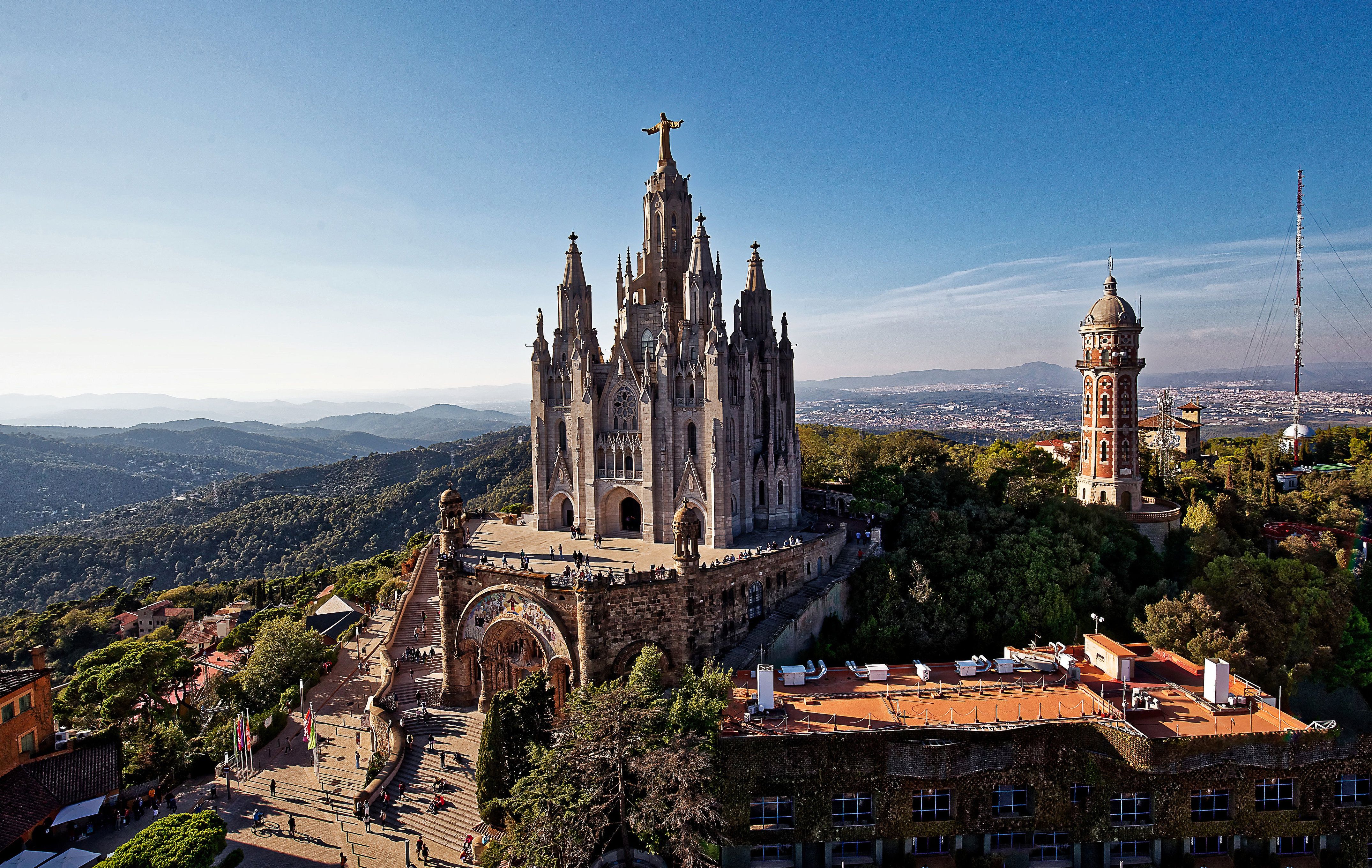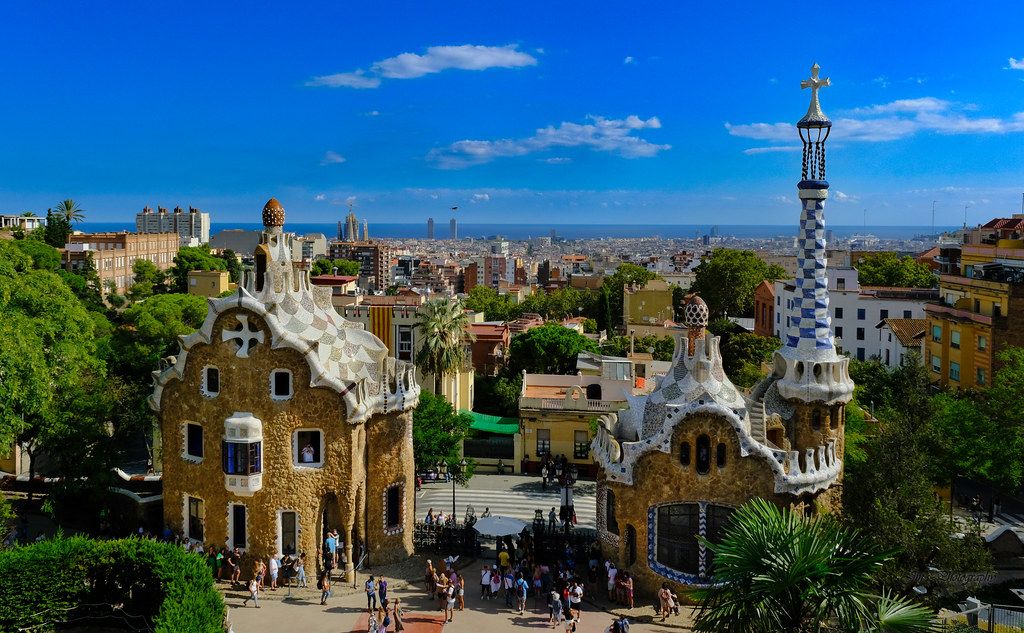Quick Summary
Here's a quick checklist of essential steps for moving to Barcelona, note these down as they are imperative to a smooth transition:
- ☐ Check visa requirements and apply for appropriate residency permit
- ☐ Secure employment or have a solid job search strategy
- ☐ Arrange accommodation (temporary or long-term)
- ☐ Register for a NIE (Foreigner Identification Number)
- ☐ Register on the Padrón (Municipal Registry)
- ☐ Set up a Spanish bank account
- ☐ Arrange health insurance or register with the public healthcare system
- ☐ Learn basic Spanish and Catalan phrases
- ☐ Research schools if moving with children
- ☐ Plan for shipping belongings or purchasing essentials in Barcelona
- ☐ Notify UK authorities of your move (HMRC, local council, etc.)
- ☐ Arrange for mail forwarding and cancel UK utilities
Understanding Barcelona

Geography and Climate
Located on the northeastern coast of Spain, Barcelona enjoys a Mediterranean climate:
- Hot, humid summers (June-August): Average highs around 28°C (82°F)
- Mild winters (December-February): Average lows around 9°C (48°F)
- Over 2,500 hours of sunshine annually
- Occasional heavy rainfall, particularly in autumn
Demographics
Barcelona is home to approximately 1.6 million people, with nearly 20% being foreign-born. This diversity contributes to the city's vibrant, international atmosphere.
City Layout
Barcelona is divided into 10 districts, each with its own character:
- Ciutat Vella: The historic centre, including the Gothic Quarter and El Born
- Eixample: Known for its grid-like street pattern and modernist architecture
- Gràcia: A trendy area popular with young professionals and artists
- Sants-Montjuïc: Home to green spaces and cultural venues
- Les Corts: A residential area with the Camp Nou football stadium
- Sarrià-Sant Gervasi: An upscale residential district
- Horta-Guinardó: A hilly area with parks and residential neighbourhoods
- Nou Barris: A diverse, working-class district
- Sant Andreu: A traditional Catalan neighbourhood
- Sant Martí: Includes the beachfront and the innovative 22@ district
Economy and Innovation
Barcelona boasts a diverse economy with strengths in:
- Tourism and hospitality
- Technology and startups
- Creative industries
- Logistics and trade
- Biomedical research
The city is also committed to becoming a smart city, with initiatives focusing on sustainability and technological innovation.
Get a
Free Quote
in seconds
Moving has bever been this simple with Deliver1
Visa and Residency Requirements
Post-Brexit, UK citizens no longer have the automatic right to live and work in Spain. The process for moving to Spain from the UK now involves more paperwork and planning.
Short-term Stays
For visits up to 90 days within any 180-day period:
- UK passport holders can enter Spain visa-free
- This allows for tourism, business meetings, or job interviews, but not paid work
Long-term Residency
For stays longer than 90 days, you'll need to apply for a residence permit. The type of permit depends on your reason for moving:
- Work Visa (Permiso de Trabajo):
- Required for most employment situations
- Usually applied for by your employer
- Process can take several months
- Non-Lucrative Visa:
- For those who can support themselves without working (e.g., retirees)
- Requires proof of sufficient funds and private health insurance
- Student Visa:
- For those enrolled in Spanish educational institutions
- Allows limited work alongside studies
- Entrepreneur Visa:
- For those starting a business in Spain
- Requires a detailed business plan and proof of investment
Application Process
- Apply for the appropriate visa at the Spanish consulate in the UK
- Once in Spain, apply for a Foreigner Identity Number (NIE)
- Register with the local town hall (empadronamiento)
- Apply for a Foreigner Identity Card (TIE) within 30 days of arrival
NIE (Número de Identidad de Extranjero)
The NIE is crucial for various aspects of life in Spain:
- Opening a bank account
- Signing a rental agreement
- Accessing healthcare
- Paying taxes
You can apply for a NIE at a police station with foreigner services or at the Immigration Office.
Useful Resources
Always check the most up-to-date information from official sources, as immigration policies can change. Consider seeking advice from a gestor (administrative assistant) or immigration lawyer if your case is complex.

Employment Landscape
Barcelona offers a dynamic job market with opportunities across various sectors. Its position as a major Mediterranean port and growing tech hub makes it attractive for international professionals.
Key Industries
- Technology and Startups:
- Barcelona is home to a thriving tech scene, often referred to as "Silicon Valley of Europe"
- Major tech events like Mobile World Congress are held here
- Tourism and Hospitality:
- A significant sector due to Barcelona's popularity as a tourist destination
- Opportunities in hotels, restaurants, tour companies, and related services
- Creative Industries:
- Strong presence in design, fashion, and media
- Home to many advertising agencies and design studios
- Finance and Professional Services:
- Many multinational companies have offices in Barcelona
- Growing fintech sector
- Education:
- Numerous language schools and international schools
- Opportunities for English teachers
Job Search Strategies
- Online Job Boards:
- Recruitment Agencies:
- Many specialise in placing international talent
- Examples include Page Personnel and Hays
- Networking:
- Join professional associations and attend industry events
- Barcelona has a vibrant expat community with regular meetups
- Language Schools:
- For those interested in teaching English, contacting language schools directly can be effective
Work Culture
- Generally less formal than in the UK
- Longer lunch breaks (often 2 hours) and later working hours are common
- August is a popular holiday month, and many businesses slow down
Employment Rights
- Standard working week is 40 hours
- Minimum of 22 working days of paid holiday per year
- 14 public holidays annually (some specific to Catalonia)
Language Requirements
- Knowledge of Spanish is often necessary, especially outside of international companies
- Catalan is widely spoken and appreciated, particularly in local businesses
Useful Resources
- Barcelona Activa: The city's local development agency, offers job search support
- EURES: The European Job Mobility Portal
- Expatica Jobs: Job listings and career advice for expats in Spain
Remember to ensure your visa allows you to work in Spain. Start your job search well in advance of your move, and be prepared to adapt your CV and interview style to Spanish expectations.

Housing and Neighbourhoods
Finding suitable accommodation in Barcelona can be challenging due to high demand and rising prices. However, with the right approach and knowledge of the city's neighbourhoods, you can find a home that suits your needs and budget.
Types of Housing
- Apartments (Pisos):
- Most common type of housing in Barcelona
- Often in historic buildings or modern developments
- Houses (Casas):
- Less common in the city centre
- More available in outer neighbourhoods and suburbs
- Rooms in Shared Apartments:
- Popular option for young professionals and students
- Can be a more affordable way to live in desirable areas
Renting vs. Buying
- Renting is most common for newcomers
- Buying property can be a good long-term investment, but comes with additional considerations for non-residents
Renting Process
- Search online platforms like Idealista or Fotocasa
- Contact estate agents (inmobiliarias) for viewings
- Prepare necessary documents (NIE, proof of income, etc.)
- Sign a tenancy agreement (contrato de arrendamiento)
- Pay deposit (usually 1-2 months' rent) and first month's rent
Popular Neighbourhoods
- Gràcia:
- Bohemian vibe with plenty of cafes and independent shops
- Popular with young professionals and artists
- Eixample:
- Central location with beautiful modernist architecture
- Divided into Dreta (right) and Esquerra (left), each with its own character
- Born and Gothic Quarter:
- Historic centre with narrow streets and abundant charm
- Can be touristy and noisy, but full of character
- Poblenou:
- Up-and-coming area with a mix of residential and tech companies
- Close to the beach
- Sant Antoni:
- Trendy area known for its food scene
- More affordable than some central neighbourhoods
Considerations When Choosing a Neighbourhood
- Proximity to work or schools
- Public transport connections
- Local amenities (shops, parks, restaurants)
- Noise levels (some central areas can be very busy)
- Touristic pressure (some areas are heavily impacted by tourism)
Useful Resources
Remember, the Barcelona housing market can be competitive. Be prepared to make decisions quickly and have all necessary documents ready when you find a place you like.
Get a
Free Quote
in seconds
Moving has bever been this simple with Deliver1
Healthcare System
Spain's healthcare system is renowned for its quality and accessibility. As a resident in Barcelona, you'll have access to both public and private healthcare options.
Public Healthcare
The Spanish public healthcare system (Sistema Nacional de Salud) provides free or low-cost healthcare to residents:
- Funded through social security contributions and taxes
- Covers most medical procedures, hospital care, and subsidises prescription medications
- Dental care is only partially covered
To access public healthcare:
- Register for social security (if working)
- Obtain a health card (Tarjeta Sanitaria Individual) from your local health centre
Private Healthcare
Many expats opt for private healthcare for shorter waiting times and more personalised care:
- Numerous private clinics and hospitals in Barcelona
- Costs vary but are generally lower than in the UK
- Many employers offer private health insurance as part of their benefits package
Health Insurance
If you're not eligible for public healthcare, you'll need private health insurance:
- Required for some visa applications
- Costs vary based on age, coverage, and any pre-existing conditions
Popular insurance providers include:
Emergency Care
- For emergencies, call 112 (equivalent to 999 in the UK)
- Emergency care is provided to everyone, regardless of residency status
Pharmacies
- Easily identifiable by a green cross sign
- Some medications that require prescriptions in the UK are available over the counter in Spain
Mental Health Services
- Covered by the public health system, but waiting times can be long
- Private options are widely available
Useful Resources
Remember to register with a local doctor (médico de cabecera) once you've settled in Barcelona. They will be your primary point of contact for most health issues.

Cost of Living and Finances
Understanding the cost of living in Barcelona is crucial for budgeting and financial planning. While some aspects of life in Barcelona can be expensive, others may be more affordable compared to major UK cities.
Comparative Costs
Here's a rough comparison of some common expenses between Barcelona and London (as of 2024):
Expense | Barcelona (EUR) | London (GBP) | Barcelona (GBP) |
| Monthly rent (1-bedroom apartment in city centre) | 1,000 | 1,800 | 850 |
| Monthly public transport pass | 40 | 180 | 34 |
| Meal at an inexpensive restaurant | 12 | 18 | 10 |
| Cappuccino | 2 | 3.50 | 1.70 |
| 1L of milk | 0.90 | 1.20 | 0.77 |
| Loaf of bread | 1.20 | 1.10 | 1.02 |
| Monthly utilities (85m2 flat) | 150 | 200 | 128 |
Note: Exchange rate used is 1 EUR = 0.85 GBP (April 2024)
Housing Costs
- Typically the largest expense
- Renting: 30-40% of income is common
- Buying: Average apartment prices in Barcelona are around €350,000 (£297,500) as of 2024
Groceries and Dining Out
- Supermarket prices are generally lower than in the UK
- Dining out can range from very affordable (€10 for a menú del día) to expensive in high-end restaurants
Transportation
- Public transport is efficient and relatively affordable with a travel card
- Taxis and ride-sharing services are cheaper than in most UK cities
Utilities and Internet
- Generally lower than in the UK
- High-speed internet is widely available and reasonably priced
Healthcare
- Public healthcare is free or low-cost for residents
- Private health insurance costs vary but are generally lower than in the UK
Education
- Public schools are free for residents
- International schools can be expensive, with annual fees ranging from €8,000 to €20,000
Taxes
- Income tax rates are progressive, ranging from 19% to 45% (as of 2024)
- 21% VAT (IVA) applies to most goods and services
Banking and Finance
- Opening a Bank Account:
- Can often be done before arriving in Spain with some banks
- Major banks: CaixaBank, Banco Sabadell, BBVA
- Online banks like N26 are popular among expats
- Required documents: NIE, passport, proof of address, proof of employment/income
- NIE (Número de Identidad de Extranjero):
- Essential for most financial transactions, including opening a bank account
- Can be obtained at the local police station or immigration office
- Credit Cards:
- Less commonly used than in the UK
- Debit cards are widely accepted
Money Transfer
- Use specialist forex services for better rates on large transfers
- Consider multi-currency accounts offered by some online banks
Useful Resources
While some aspects of life in Barcelona may be more expensive than in the UK, many expats find that the overall cost of living is lower, especially when it comes to day-to-day expenses. Careful budgeting and financial planning will help ensure a smooth transition to your new life in Barcelona.
Transportation
Barcelona boasts an efficient and comprehensive public transportation system, making it easy to navigate the city without a car.
Public Transport
Barcelona's public transport system, TMB, includes:
- Metro:
- 12 lines covering most of the city
- Runs from 5am to midnight (later on weekends)
- Buses:
- Extensive network of day and night buses
- Many routes are now served by electric or hybrid buses
- Trams:
- Six tram lines, mainly in the outskirts of the city
- FGC (Ferrocarrils de la Generalitat de Catalunya):
- Local and regional train service
Travel Cards:
- Hola Barcelona Travel Card: Unlimited journeys for 48, 72, 96, or 120 hours
- T-casual: Multi-journey ticket for occasional travellers
- Monthly and yearly passes available for residents
Cycling
Barcelona is increasingly bike-friendly:
- Extensive network of cycle lanes
- Bicing: City's bike-sharing scheme (requires resident registration)
Walking
Many areas of Barcelona are very walkable, especially in the city centre
Taxis and Ride-sharing
- Black and yellow taxis are plentiful
- Ride-sharing apps like Cabify operate in Barcelona (Uber has limited operations)
Driving
- Not necessary for daily life in Barcelona
- Parking can be challenging and expensive in the city centre
- Consider car-sharing services like Drivy for occasional use
Useful Resources
- TMB: Barcelona's main public transport operator
- Bicing: Barcelona's bike-sharing scheme
- AMB Mobility: Information on all transport in the Barcelona metropolitan area
Get a
Free Quote
in seconds
Moving has bever been this simple with Deliver1
Education System
Barcelona offers a range of educational options, from local Spanish/Catalan schools to international institutions.
School System
- Compulsory education from age 6 to 16
- Many schools offer pre-school from age 3
Types of Schools:
- Public Schools:
- Free for residents
- Teach primarily in Catalan, with Spanish and English as additional languages
- Concertada Schools:
- Semi-private, partially subsidised by the government
- May offer more subjects in Spanish or English
- Private Schools:
- Fully independent, charge tuition fees
- Often offer bilingual or trilingual programmes
- International Schools:
- Teach in English or other languages
- Follow curricula like British, American, or International Baccalaureate
- Higher fees, but familiar system for expat children
School Levels
- Educación Infantil (Pre-school): Ages 3-5
- Educación Primaria (Primary): Ages 6-12
- Educación Secundaria Obligatoria (ESO): Ages 12-16
- Bachillerato (non-compulsory secondary): Ages 16-18
Higher Education
Barcelona hosts several renowned universities:
- University of Barcelona (UB)
- Autonomous University of Barcelona (UAB)
- Polytechnic University of Catalonia (UPC)
Many programmes are offered in English, making them accessible to international students.
Language Considerations
- Public schools teach primarily in Catalan
- Many private and international schools offer education in Spanish and/or English
- Learning Catalan is important for full integration into the local community
Useful Resources
Language and Culture
While it's possible to get by in Barcelona using only English, learning Spanish and Catalan can significantly enhance your experience and integration into local life.
Languages
- Catalan is the co-official language along with Spanish
- Many locals appreciate efforts to learn and use Catalan
- English is widely spoken in tourist areas and international companies
Learning Spanish and Catalan
- Many language schools offer courses in both languages
- The Consorci per a la Normalització Lingüística offers free Catalan courses
- Apps like Duolingo or Babbel can be useful for self-study
Catalan Culture
- Strong sense of regional identity
- Traditions include human towers (castells) and fire runs (correfocs)
- Important festivals: La Mercè, Sant Jordi, Sant Joan
Spanish Culture
- Emphasis on social life and family
- Late meal times: lunch around 2pm, dinner around 9pm
- Siesta culture, though less common in Barcelona than in smaller towns
Etiquette Tips
- Greeting with two kisses on the cheeks is common
- Tipping is appreciated but not obligatory
- Punctuality is less strict than in the UK, especially for social events
Useful Resources
Preparing for the Move
Proper preparation is key to a smooth transition to life in Barcelona.
Checklist
- Visa/Residency: Ensure you have the necessary permits
- Housing: Arrange temporary or permanent accommodation
- Employment: Secure a job or have a job search strategy
- Healthcare: Arrange health insurance or register with the public system
- Finances: Inform UK bank of move, research Spanish banking options
- Education: If applicable, research and apply to schools
- Pets: Check requirements for bringing pets into Spain
- Shipping: Arrange shipping of household goods
- Documents: Gather important documents (birth certificates, qualifications, etc.)
- Utilities: Research Spanish providers for electricity, internet, etc.
- Taxes: Inform HMRC of your departure from the UK
Timeline
- 6-12 months before: Start visa application process, job search
- 3-6 months before: Secure housing, arrange shipping
- 1-3 months before: Set up health insurance, notify relevant UK authorities
- 1 month before: Confirm all travel arrangements, pack essentials
Useful Resources
Settling In
Once you arrive in Barcelona, these steps will help you establish your new life:
- Registration: Register on the Padrón at your local city hall
- NIE: Obtain your Foreigner Identification Number
- Bank Account: Open a Spanish bank account
- Healthcare: Register with a local doctor if using public healthcare
- Transportation: Get a travel card for public transport
- Language: Start Spanish and/or Catalan lessons
- Social Life: Join expat groups or local clubs to meet people
- Explore: Familiarise yourself with your neighbourhood and the city
Remember, settling into a new country takes time. Be patient with yourself and open to new experiences. Barcelona's international character means you'll likely find a welcoming community as you adjust to your new home.
Moving to Barcelona from the UK is an exciting adventure that offers numerous opportunities for personal and professional growth. While challenges may arise, the city's vibrant culture, excellent quality of life, and beautiful surroundings make it a rewarding destination for expats. With careful planning and an open mind, you'll soon find yourself enjoying tapas in Gothic Quarter plazas, sunbathing on Barceloneta beach, and marvelling at Gaudí's architectural wonders.
Ready to make Barcelona your new home? Let Deliver1 take the hassle out of moving. We’re experts in international relocations, and we’ll handle everything from packing to customs clearance. Contact us today for a free quote and let us help you start this exciting new chapter in your life.





